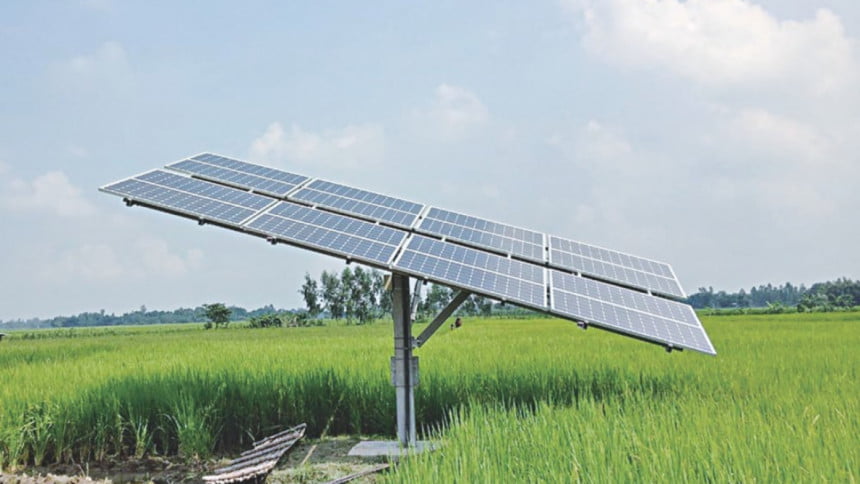Bangladesh Rural Electrification Board (BREB) plans to install 2,000 solar irrigation pumps under a project — allowing farmers to sell their unconsumed electricity to the national grid.
The solar power-run pumps will replace the existing conventional diesel-run machines in 21 districts under a pilot project, said officials at the BREB.
They said BREB’s move comes as part of the government’s long-term aim to gradually replace the existing 1.34 million diesel-run irrigation pumps across the country.
In the first phase of the project, the Cabinet Committee on Public Purchase has recently approved four separate tender proposals of BREB to install 1,295 solar irrigation pumps at a cost of about Tk 157 crore.
“These pumps will be installed in the districts of Nagaon, Dinajpur, Thakurgaon, Gopalganj, Faridpur, Madaripur, Cumilla, and Feni under different rural electricity cooperatives known as Palli Bidyut Samity (PBS),” according to a BREB document.
BREB officials claimed that under the new system, solar electricity will have better utilization by transmitting the off-irrigation power to the national grid.
“We have calculated that farmers normally use pumps for 115-120 days of a year for irrigation, while the rest of the year the pumps remain off when solar electricity has no use,” said Shakil Ibn Sayeed, project director of the BREB.
“So, BREB will purchase this electricity from the farmers at a bulk rate to ensure a better use of the unconsumed electricity”, he told UNB.
BREB officials informed that though they will install the solar irrigation pumps at BREB’s own cost under a hire-purchase arrangement, the farmers will finally be their owners by repaying in installments over a 10-year period.
They said the BREB will bear 90 percent of the cost and the farmers will only make a 10 percent down payment to own the solar irrigation pumps.
“BREB will provide 65 percent as grants and the remaining 35 percent as loan,” said another BREB official adding that the distribution entity will build the required power transmission lines at its own cost to facilitate farmers’ sale of the electricity to the national grid.
“Different organizations including Infrastructure Development Company Limited (IDCOL), BREB, and Bangladesh Agriculture Development Corporation (BADC) have been working on solar irrigation pumps in different ways at different places without any coordination”, observed Munawar Moin, senior vice president of Bangladesh Solar and Renewable Energy Association (BSREA).
He said if there is a coordinated and comprehensive plan with a long-term vision, the project will be more effective and useful to ensure the best use of the solar system and water from the pumps.
BREB officials said that under its current project, about Tk 10 lakh will be spent for each pump having solar panels and also three horsepower irrigation pumps and a transmission line. Of this, about Tk 7.5 lakh will be spent on solar panels and pumps while 2.5 lakh will be spent on building transmission lines to the national grid at 11 kV level.
The BREB will buy each unit of electricity at Tk 4.36, a bulk rate, applied in purchasing electricity from BPDB at the 11 kV level, they noted,
They added that if a farmer takes a system from BREB, it will not become an extra load on him to pay as he can pay in installments from his earnings by selling electricity to the grid.
The BREB project director said that they are getting a huge response as 2,400 farmers already applied for the irrigation pumps. But those who can manage a clearance from Upazila irrigation committee will be eligible to get the pumps.
Statistics from a draft report of Sustainable and Renewable Energy Development Authority (SREDA) on National Solar Energy Roadmap 2021-41 show that so far 1,872 solar irrigation pumps were installed across the country by different organizations.
Of these, BREB installed 40, IDCOL 1523, BADC 137, Barendra Multipurpose Development Authority (BMDA) 106, Rural Development Academy (RDA) 15, and other authorities 51 which have installed a power generation capacity is 43.178 MW.



